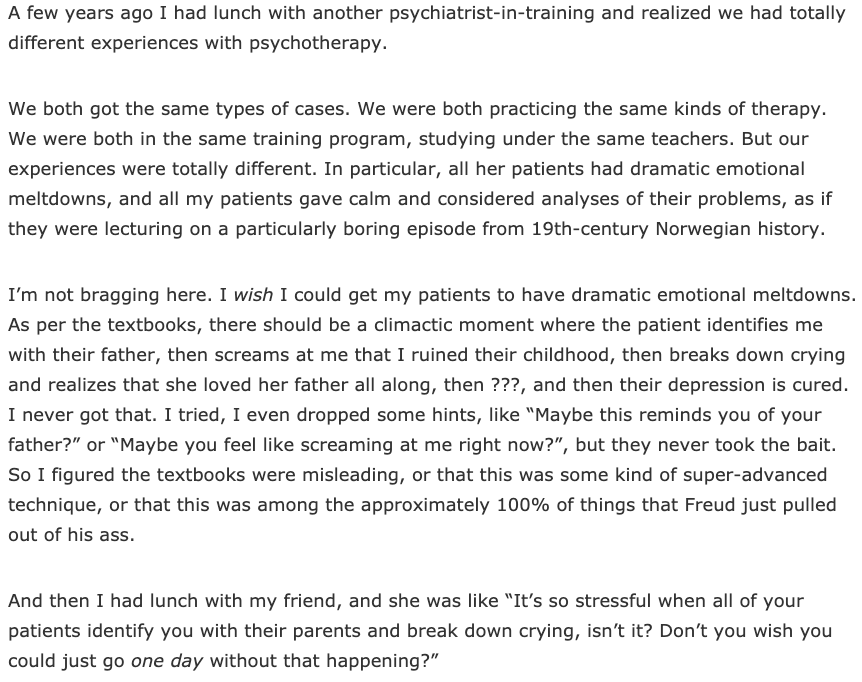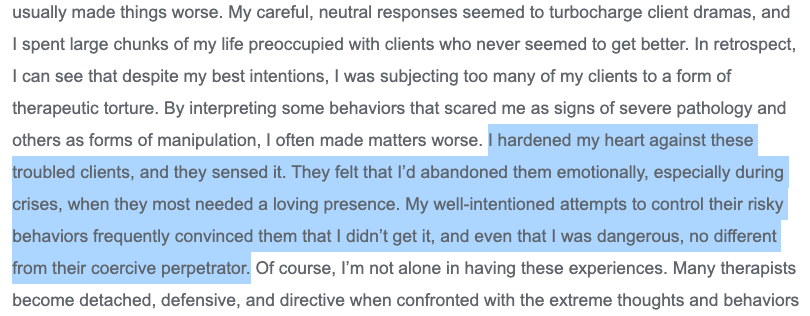@slatestarcodex post on therapy books all promising to bring about revolutionary change but all therapies seeming about equally okay in studies. i have many thoughts:
1. what if therapies start out effective but people adapt to them over time https://slatestarcodex.com/2019/11/20/book-review-all-therapy-books/">https://slatestarcodex.com/2019/11/2...
1. what if therapies start out effective but people adapt to them over time https://slatestarcodex.com/2019/11/20/book-review-all-therapy-books/">https://slatestarcodex.com/2019/11/2...
people mostly *do not want to change* and *actively resist change*. change is terrifying. so maybe any therapeutic modality that produces change by getting past all common forms of defenses eventually gets stymied by a new set of defenses; a psychological immune response
2. what if therapists mostly suck at learning modalities of therapy
several people have told me that me doing my work on them has been better than any therapy they& #39;ve had. i have no formal training or certification, i& #39;ve just been dicking around. this is nuts
several people have told me that me doing my work on them has been better than any therapy they& #39;ve had. i have no formal training or certification, i& #39;ve just been dicking around. this is nuts
new therapies are originated by masters who really understand how to do the thing fully, with their whole being; passing on secret arts like this is *very hard* and i bet it mostly doesn& #39;t happen, certainly not at scale
3. what if everyone, therapists and clients, has just gotten ambiently worse at having feelings
UtEB& #39;s model of how transformative change happens involves people *experiencing* their own emotional truths, and i think people have gotten worse at this over time
UtEB& #39;s model of how transformative change happens involves people *experiencing* their own emotional truths, and i think people have gotten worse at this over time
experiencing emotional truth can be very, very painful, and people can and will do all sorts of things to avoid it, internally and externally. UtEB emphasizes that to do transformative work requires being very sensitive to exactly what& #39;s going on for the client, esp. resistance
peter levine says that therapists have to be willing to feel themselves in order to help clients feel themselves, and if you yourself aren& #39;t willing to do this as a therapist you will find that your clients don& #39;t do it either, exactly as scott describes in an older post
i actually *have* had moments where i broke down crying realizing i loved my father all along, but i& #39;ve met scott and i can confidently tell you that i would never have had them with scott (sorry scott, i wouldn& #39;t be saying this if i didn& #39;t think you wanted to know)
scott, and many other rationalists for that matter, exudes an "i am uncomfortable with strong emotions" field; you cannot do effective therapy this way, or even have much fun at parties (have i told you how much i hate rationalist parties, the answer is a lot)
richard schwartz, the IFS guy, has this lovely (and very poorly formatted) article about working with borderline clients, where he describes making things worse by *hardening his heart* against them; he had to reopen his heart to make progress
http://www2.psychotherapynetworker.org/magazine/recentissues/2013-mayjune/item/2130-depathologizing-the-borderline-client">https://www2.psychotherapynetworker.org/magazine/...
http://www2.psychotherapynetworker.org/magazine/recentissues/2013-mayjune/item/2130-depathologizing-the-borderline-client">https://www2.psychotherapynetworker.org/magazine/...
there is this whole-ass thing i wish i could articulate better about how limiting the medical model of "mental health" is. transformative work *changes who you are* and that requires both the therapist and the client to confront aspects of being that the medical model ignores
my dream vision of "therapy" is two human beings fully present with each other going on a journey into the vast unknown together. i would be *shocked* if therapy programs taught you how to do this. i expect that instead they teach "professionalism"
the hope of the medical model is that the only thing the client experiences about a therapist is the content of the words they say. this is impossible. the client is always experiencing the therapist& #39;s way of being, whether or not either of them is consciously aware of it
we sense so much more about each other than most people are willing to admit in polite company. the therapist is constantly leaking emotional information to the client through facial expression, tone of voice, body posture, and this stuff *matters* for how safe the client feels

 Read on Twitter
Read on Twitter



